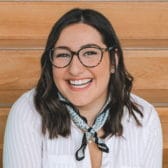
Some people spend their whole lives training for the Olympics — after all, it is the event of a lifetime for pro-athletes!
Yet, Avi Schafer didn’t always think he would be a professional basketball player. He initially played soccer in high school, before switching to basketball at the age of 16. He was completely off the Japan Basketball Association (JBA) radar and played the game “for fun,” he told the Japan Times.
That is, until he played against the Japan U-16 national team in 2015. Schafer drew the attention of JBA officials, eventually joined the national team, and that opened the door for him to pursue a professional career in basketball.
Now, he’s playing on Japan men’s basketball team in the Tokyo Olympics!
Here are some more things to know about the 23 year-old Jewish basketball player.

He was born in Japan
Avi Koki Schafer was born in Suita, Osaka, Japan, on January 28, 1998.
He’s a dual citizen
His mother, Sayuki, is Japanese and his father, Douglas, is a Jewish American. Schafer speaks both English and Japanese fluently.
Here’s what his Hebrew and Japanese names mean
The name Avi means “my father.” Traditionally, Avi was a nickname for the biblical patriarch, Abraham but in the mid-1900’s Avi was popularized as a standalone name among Jewish and Israeli communities.
Schafer’s middle name, Koki, means bright light and hopeful fortune in Japanese.
He’s really tall
Schafer is 6”9, and his height has become a running joke in his family.
“We always joke, ‘How did Avi get so tall?’,” his father told the Pittsburgh Jewish Chronicle. “And I say, ‘Well, he’s Japanese and he’s Jewish, which means you got two negatives on height, which actually equal a positive.”
His parents have a sweet love story
Avi’s dad, Douglas Schafer, grew up in Pittsburgh.
He was bar mitzvahed at Rodef Shalom Congregation and had a group of Jewish friends, according to the Pittsburgh Jewish Chronicle.
After college, he participated in the JET Program USA, an employment opportunity that places young international professionals throughout Japan. That’s where he met his now-wife, Sayuki Asai. Asai had studied in the United States and Schafer was relieved to hear a “friendly English voice from time to time,” he told the Chronicle.
You can imagine how the story goes from here. They were friends at first but friendship turned to love, and the pair married around a year later in Japan.

Schafer has 2 brothers
Avi’s older brother Yuki Aaron, 26, serves as Avi’s agent, and his younger brother, Toki Tobias, 21, is studying art at the Pratt Institute in New York.
They are part of a small community of Jews in Japan
As of 2016, there were between 1,000 and 1,400 Jews in Japan, according to the World Jewish Congress.
When Avi was younger, he and his family lived in Kobe, Japan — which, as it happens, has a significant Jewish history.
Kobe existed as a safe haven for thousands of Jews fleeing Europe during 1940 and 1941. David Kranzler, an American professor who specialized in the study of the rescue of Jews during the Holocaust, wrote about it extensively in his book “Japanese, Nazis & Jews: The Jewish refugee community of Shanghai.” At its height, the Jewish community of Kobe had thousands of residents and two synagogues, but shrunk drastically after World War Two.
Schafer’s dad, Douglas, was a board member of the Ohel Shelomo Synagogue, a Sephardic Orthodox congregation in Kobe where the rabbi was a Chabad emissary and congregants were largely Israeli, Syrian, Armenian and American, Douglas said in an interview.
The family moved to Tokyo nine years ago
When the family moved to Tokyo nine years ago, just befoer Schafer began to play basketball, they lived near the Jewish Community Centre in Tokyo. Since there was a greater number of Jews in the area, the Schafers began to experience Judaism more socially than through synagogue attendance, Douglas told the Chronicle.
Originally Published Jul 28, 2021 12:03AM EDT

